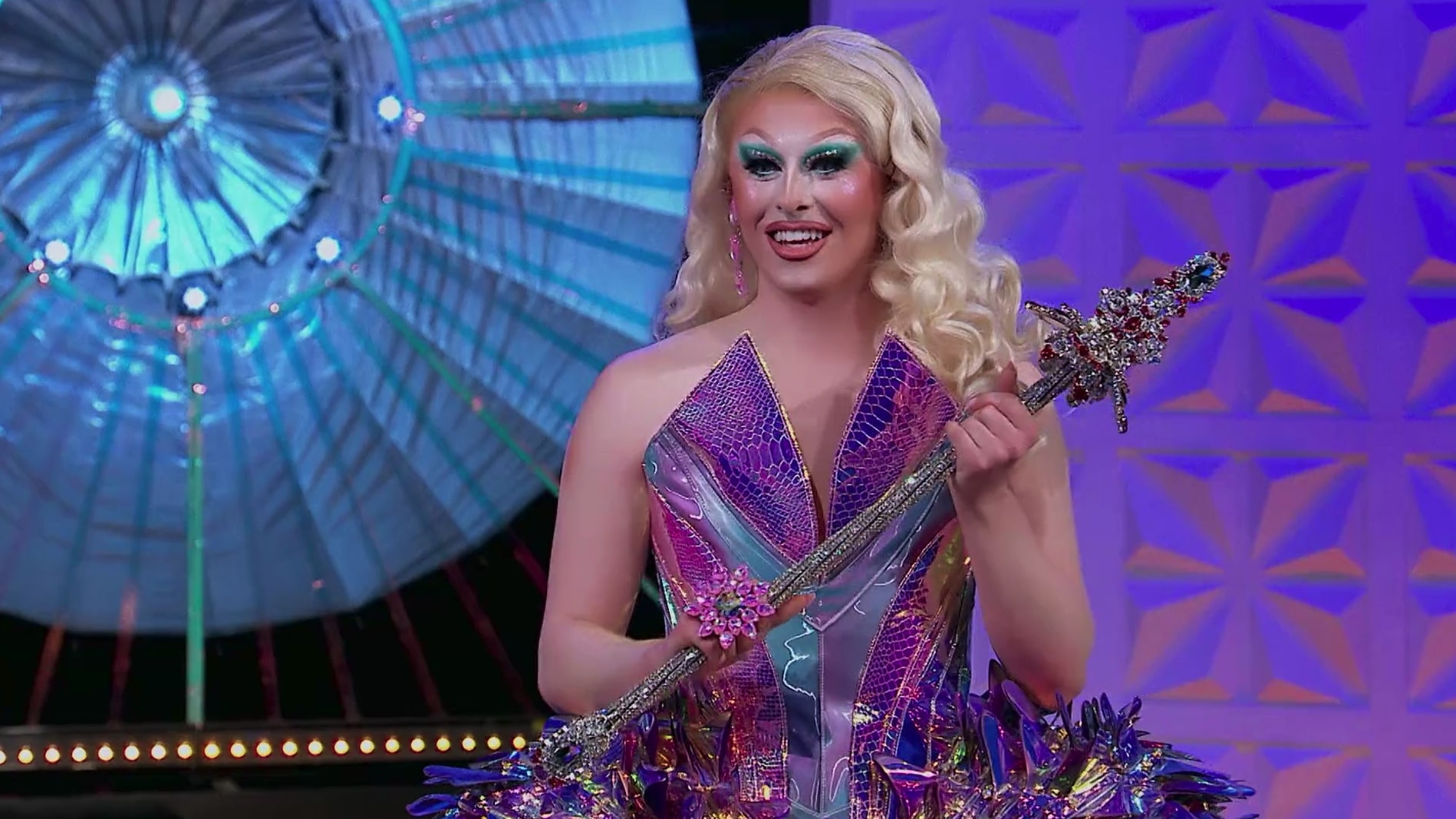There’s a moment in the finale of RuPaul’s Drag Race: UK Versus The World where Belfast queen Blu Hydrangea is asked to explain the inspiration for the exquisite Alice blue frock she is wearing on the runway. “I wanted to incorporate the dove on my bodice,” she tells the judges’ panel of RuPaul, Michelle Visage and South Dublin’s own Graham Norton. She gestures to the silver dove appliqué lovingly rhinestoned across her chest. “It’s holding a little Irish flag and a little Union Jack because it represents my country.” The camera cuts to a beaming Norton, his face radiating pride. “There’s a troubled past with Northern Ireland,” Blu continues, “and I just want to show that there is a future of peace.”
By the end of the episode, Blu Hydrangea is crowned Queen of the Mothertucking World by RuPaul herself. Norton, who left Ireland thirty years ago to escape homophobia, looks on as Blu proudly proclaims that she’s bringing the crown home to Belfast. The significance might be lost on most of the Drag Race audience, but for LGBTQ+ Irish people both on the island of Ireland and around the world, it’s a beautiful full-circle moment.
The Drag Race fandom at large does not seem to share my enthusiasm for Blu’s win. She did, after all, controversially vote to eliminate frontrunner Pangina Heals from Thailand in Episode 4 before taking out fan-favourite Americans Jujubee and Mo Heart in a lip-sync battle for the crown. Despite her solid track record in the competition, her stunning avant-garde runway looks and her ruthless strategic gameplay, there’s a pervasive belief in the fandom that she didn’t earn her win. But to me, a queer kid raised by my Irish Catholic grandparents, Blu Hydrangea’s triumph feels like the culmination of a long, long journey.
My family is not from the North; the Cooneys are working-class Catholics from the south side of Dublin. The violence of The Troubles, so eloquently referenced by Blu in her finale speech, was more of an abstract horror for my family than a reality of daily life. I was born and raised in Toronto. I live in a country where the civil rights of LGBTQ2S+ people were enshrined in the constitution long before I knew that those rights applied to me. All of this is to say that I didn’t expect to connect to Blu’s story in the way that I did. But like me, Blu Hydrangea is proud to be Irish. Like me, she is proud to be queer. And like me, she had to learn how to be queer in a culture mired in religious conservatism.
Religion sort of happens by osmosis in Ireland. If you’re from the overwhelmingly Catholic Republic, you tend to end up a Catholic whether you want to or not. For centuries, the Roman Catholic Church was the dominant cultural, political and social institution. The result was a sexually repressive and deeply misogynistic society. My grandparents remained devout Catholics long after they settled in Toronto, and certain ideas about gender, marriage and sexuality were deeply entrenched. Gender roles were finite, marriage was forever, and queer and trans people were inherently ridiculous.
In mostly Protestant Northern Ireland, the fundamentalist Free Presbyterian Church of Ulster and its political wing, the Democratic Unionist Party, were a dominant cultural force. Despite being vociferously anti-Catholic, the Free Presbyterian Church espoused very similar views on gender and sexuality. In the 1970s, they lobbied against the decriminalization of homosexuality with a campaign somewhat hilariously called Save Ulster From Sodomy. The North was perhaps even more repressive for LGBTQ+ people than the Republic, with a militarized police force often given free rein to terrorize members of the community.
For decades, change was painfully, incrementally slow. By the mid-1990s however, a progressive president, a booming economy, increased immigration and the exposure of multiple scandals within the Church led to a cultural sea change in the Republic. President Mary Robinson decriminalized homosexuality in 1993, kicking off two decades of civil rights reforms and gradual societal acceptance of LGBTQ+ people. In 2014, legendary Irish drag queen Panti Bliss gave an impassioned speech in favour of same-sex marriage at Dublin’s storied Abbey Theatre.
Video of the speech went viral and “Panti’s Noble Call,” as it came to be known, would galvanize a generation of activists. In 2015, the citizens of the Republic of Ireland voted overwhelmingly to legalize same-sex marriage. From my home in Toronto, I watched as the YES side took South-Central Dublin with 72 per cent of the vote.
Four years later, Blu Hydrangea, echoing Panti’s Noble Call, used her first appearance on RuPaul’s Drag Race UK Series 1 to advocate for same-sex marriage in Northern Ireland. She would see those dreams realized in late 2019. Just over two years later, she would make her second appearance on Drag Race, initiating an emotional conversation with Dutch queen Janey Jacké and American Mo Heart about growing up gay in a conservative religious home. Heart shared her experience of undergoing conversion therapy, a practice that Northern Ireland politicians finally voted to ban in April 2021, less than a month after shooting wrapped on UK Versus The World. A year later, a non-binary queer person from Belfast was crowned the “queen of the world” on the BBC.
For the Irish, stories are currency. There are the stories we tell about the big stuff: about ourselves as a people, about the North and the South, about men and women, about Catholics and Protestants. Then there are the myriad little stories we trade around the kitchen table, down the pub, at parties and weddings and funerals and Christmases. Blu Hydrangea has given us a new story to add to our arsenal. “Do you watch that Drag Race?” I can imagine my Nana saying as she puts the kettle on. “Did you see yer wan from Belfast won?”


 Why you can trust Xtra
Why you can trust Xtra


